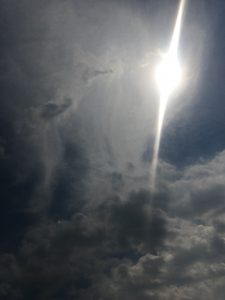As I watched the eclipse—through special glasses—I couldn’t help but wonder what an eclipse might mean to people from a time & place without the science needed to predict or understand it.
I watched it from the 72nd Street Pier on the West Side of Manhattan with my cousin, some friends, and a picnic lunch. We knew exactly what was going to happen and we even had reports from my cousin’s husband in Northern California as he previewed our experience and gave a few safety oriented photographic suggestions.
As the eclipse rolled across the country—from West to East, in a diagonal line, from North to South—neither Berkeley nor New York City were in the path of the ‘TOTALITY’ but our 70% eclipse was still quite a show. In the blackout glasses I saw NOTHING, absolutely nothing, when I looked in the direction of the river, the people I was with, even at my own feet, but when I turned around to face the sun, I saw the moon’s shadow passing over the sun; and clouds dancing on the decreasing and then increasing crescent of the star.
My science fiction fan cousin talked about famous science fiction stories featuring eclipses and I’ll delve into them another time, after I read, or reread, a few. In the moment—munching on picnic food & with people enjoying a late summer day near the water—I thought about the terror that a total eclipse might inspire—even in cultures with the astrological sophistication to predict the sun’s return.
The Aztecs and Mayans were extraordinary astronomers and capable of predicting an eclipse, but to many ancient peoples an eclipse was a frightening event. I read recently that, although they could predict an eclipse, the ancient Chinese explained it as a giant creature (a dragon or a dog) “eating” the sun. Not far off from the Viking idea of two wolves devouring the sun and moon.
Since Monday I’ve been pondering my own calm enjoyment of what would have been a terrifying and awesome event, fraught with mystical, spiritual, and magical power to a woman on a riverbank in the long distant past. Would the mythology of her people give her comfort? Would she believe the world was ending? Would she stare at the sun?






Boise had 99.5% totality, but a drive to Weiser put me in the path of totality. The sight of the corona is something I won’t soon forget. When darkness hit, everyone in lining the streets and yards of town screamed.
Wow!
I’m envious. The 70% was an entirely different experience. Sort of meditative, but also social. I could have just gone up to the roof of my building, but the idea of the Pier was so tempting and it felt like an odd little party with assorted New Yorkers. I hope you write something wonderful about the totality experience!!!
Don’t think I’ve ever directly witnessed a total eclipse, or even a partial one, but I can imagine primitive people staring at this terrifying phenomenon…and paying the price.
They wouldn’t know not to stare, and I can imagine that some of them, at least, would be blinded as a result. What would happen to a suddenly sightless person in a primitive culture?
I imagine they wouldn’t live long, thereby increasing the mythos of the eclipse as a punishment from the gods. -shudder- I’m glad we’re living in the age of reason. More or less.
More or less… Between the climate deniers and the general irrational fog in the air, I’m pretty sure that this is an age of Un-Reason (or unreasonable assumptions).
I remember “watching” an eclipse as a child with the shadow box method. But this was different. Because it was partial (or I was in the track of a partial) glances at the sky were like my photo and not the scary darkness with a corona of bright light that entranced—and might have blinded— ancients looking up at the inexplicable phenomenon. Still, I couldn’t help but wonder. My science fiction fan cousin recounted a number of famous eclipse stories as the picnic progressed. Eclipses have inspired many storytellers.